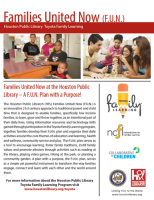Families United Now at the Houston Public Library
Houston Public Library, Texas
Innovation Synopsis
Challenge/Opportunity
Using new information resources and technology, together, families develop their F.U.N. plan and organize daily activities around core themes of education, health and wellness, community service and play. The F.U.N. plan serves as a tool to encourage learning, foster family traditions, instill family values and promote altruism through activities such as reading at the library, playing video games, hiking at the park, or planting a community garden. A plan with a purpose, the F.U.N. plan serves as a simple yet powerful instrument to transform the way families engage, connect and learn with each other and the world around them.
Key Elements of Innovation
The Houston Public Library, through its family centered learning focus is equipping families, specifically underserved families, with the knowledge, tools, and resources necessary to achieve real quality of life change for themselves and their community. The F.U.N. plan positions families for success through targeted learning engagement that strengthens the whole family. Significantly, the F.U.N. also positions the library as a family learning innovator and serves as a revolutionary approach to families learning together that can be easily adopted and modeled.
Achieved Outcomes
The F.U.N. plan received the National Center for Families Learning first ever Innovation Showcase Award in 2015 for advancing the field of family engagement through an innovative approach in leading the next generation of families learning together. Perhaps most importantly, families utilizing the F.U.N. plan have been motivated to change their lifestyles and improve their own behaviors towards the end goal of a stronger family unit. Equally compelling is the newly perceived outlook families report about their children’s future success. Of those surveyed, 56 percent report a positive viewpoint, which far exceeds how they felt initially at 25 percent.

